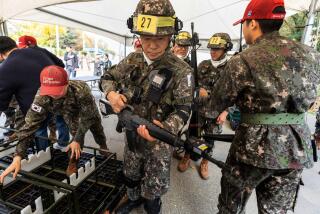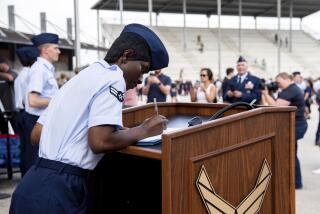Uncle Sam Wants You, Iraqis Told
- Share via
BALAD, Iraq — The United States is urging Iraqis to take more responsibility for their own security, and Kasim Adnon -- 23, jobless and under threat of death from a local mullah -- is at the vanguard of that push.
Adnon is in the first class of recruits for the Iraqi Civil Defense Corps, a group that ultimately will number 20,000 and whose job will be to patrol cities and the countryside, keep the peace, gather intelligence and impose the order that Iraq is still lacking nearly four months after President Bush declared major combat operations over.
“There is someone murdered every day in my town. There are many areas that are unsafe, and I want to help stabilize it. I need a job also,” said Adnon, who is from Taramiyah, a town not far from here in an area northwest of Baghdad where anti-U.S. sentiment runs high.
In the wake of bombings at the Jordanian Embassy and U.N. headquarters in Baghdad, plus sabotage of pipelines and continuing attacks on coalition forces, U.S. officials say Iraqis such as Adnon must be trained and put into uniform quickly in order to gain and maintain the peace in this country.
The Pentagon hopes that in addition to conducting routine patrols, these Iraqis can help improve the volume and quality of local intelligence, which many observers say are abysmal.
U.S.-led trainers at bases across Iraq are trying to muster no fewer than three types of security forces as well as local police units.
The largest is the new Iraqi army, which is expected to have 12,000 members in a year and 40,000 by 2005. At least an equal number of Iraqi border and infrastructure guards are also being trained in addition to the Civil Defense Corps. And coalition forces are giving lessons to 35,000 police officers.
Adnon completed his first week of training Thursday at the Balad airfield, where soldiers of the 4th Infantry Division gave him and 26 other recruits basic lessons in first aid, firearms and the rules of engagement.
The recruits, whose average age is 30, made visible daily progress and impressed their trainers with their enthusiasm, said Lt. Michael D. Corley, who supervises the class.
“They’ll also take our place at checkpoints and on some of the security missions we do,” Corley said.
Iraqis say they are eager to take on the responsibility.
“U.S. soldiers don’t understand Iraqis,” said Alla Khalife, 29, another enlistee from Taramiyah who was a sergeant in the old Iraqi army. “It is better if I deal with Iraqis.”
As for the police training, many of the instructors are U.S. military police officers. One such unit is the 156th “Law and Order” Army Reserve attached to the 101st Airborne Division, which is training the city police force of Dehok, in northern Iraq.
“There are some cultural differences we are adjusting to -- like handling domestic disturbances -- which are tricky. Police here don’t have the arrest powers we do in the States,” said instructor Maj. Scott Fuller, who is a police officer in Huntington, W.Va., in civilian life.
Ultimately, the training will reduce the burden on coalition units, including the 4th Infantry’s 68th Armored Regiment, which is training Adnon’s unit in Balad. But for now, it is an added responsibility, and the unit, under Capt. Mark Bailey, had plenty to do before the first class arrived last Saturday.
Bailey’s company runs two armored patrols per day, often up and down Highway 1, this country’s main north-south road. His company also guards a corner of the sprawling airfield compound in Balad and helps staff the Quick Reaction Force, a kind of armored SWAT team on 24-hour call to respond to hostile fire in the area.
All that is in addition to teaching the recruits. The training facilities are often impromptu, such as the abandoned munitions bunker at the airfield complex used to train Adnon and his class. The training cycle is also compressed, lasting just three weeks, or less than half the basic training time U.S. Army recruits receive.
But officials here say they can’t afford to wait. The success of the occupation authority’s efforts in Iraq hangs in the balance.
Adnon, who will earn $70 a month as a civil guard, enlisted in the corps despite threats from occupation opponents. He is undeterred, he said, by a mullah of the strict Wahhabi sect who at recent Friday prayers said the death of any Taramiyah men who joined the force “would be good for our religion.”
“He says we are spies,” Adnon said. “Even though I am here, I am afraid. I could go out from this compound and be dead. But I believe in this job and I will walk my way, not where others tell me.”
*
Times staff writer John Hendren in Washington contributed to this report.
More to Read
Sign up for Essential California
The most important California stories and recommendations in your inbox every morning.
You may occasionally receive promotional content from the Los Angeles Times.










